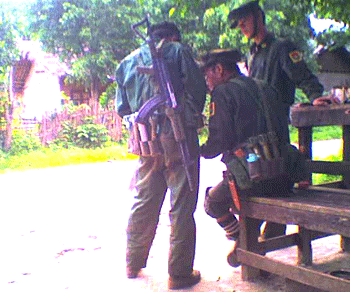The Chinese Communist Government will not supply weapons to the Kachin Independence Army (KIA), if civil war breaks out between the KIA and Burmese Army ...
The Chinese Communist Government will not supply weapons to the Kachin Independence Army (KIA), if civil war breaks out between the KIA and Burmese Army, according to Chinese authorities.
 KIA officials project armed conflict could spread to northern Burma from the current fighting between the Democratic Karen Buddhist Army (DKBA) and Burmese Army in Myawaddy and the Three Pagoda Pass, near the Thai border, which started on November 7, the election day in Burma.
KIA officials project armed conflict could spread to northern Burma from the current fighting between the Democratic Karen Buddhist Army (DKBA) and Burmese Army in Myawaddy and the Three Pagoda Pass, near the Thai border, which started on November 7, the election day in Burma.
China, the neighbour and the arch ally of the Burmese military junta, said it will not supply arms to the KIA because the Kachin people are predominately Christian and are pro-USA, according to Kachin (Jingpo in Chinese) leaders in China’s Yunnan Province.
A Jingpo leader in the Dehong-Jingpo Autonomous Prefecture told the Thailand-based Kachin News Group, “The communist Chinese government will not give military support to the KIA. China distrusts the KIA and the Kachin people because of their belief in the Christian religion seeded by American missionaries”.
The minority Kachin, Chin and Karen ethnic groups say they have been treated as enemies by successive governments in the majority Buddhist multi-ethnic Union of Burma, since independence from British rule in 1948, because they are Christians.
Sources close to Chinese Government officials in Yunnan said China could provide a small amount of military support to the non-Christian ethnic armed groups in Shan State, if civil war breaks out there between ethnic armed groups and the Burmese Army.
Zahkung Ting Ying, and other senior leaders of the former New Democratic Army-Kachin (NDA-K) also criticized the KIA and its political wing, the Kachin Independence Organization (KIO), saying their policies have failed because churches dominate them.
Ting Ying and Layawk Ze Lum split from the KIO/KIA in 1968, and joined the Communist Party of Burma (CPB), which was politically and militarily supported by China before the NDA-K was formed in 1989. It broke away from the CPB in the same year. The NDA-K came under the control of the Burmese Army in November, 2009.
China expelled dozens of Jingpos (Kachins) from their jobs in government offices in Yunnan Province in the 1980’s, accusing them of supporting the KIO/KIA, according to leaders in Dehong-Jingpo Autonomous Prefecture, Yunnan Province.
KIA officials in its Laiza Headquarters, in eastern Kachin State, near the China border said China agreed to supply weapons to the KIA in the1980s. However, they were always confiscated by Chinese authorities before reaching the KIA.
KIA officials said several KIA strongholds, including its Nahpaw-Pajau Headquarters, near the China border, have fallen to the Burmese Army because the Chinese have often allowed Burmese troops to enter its territories to capture KIA strongholds.
According to CPB veterans in Mongkoe, the former Headquarters of the CPB in Northern Shan State, the secret involvement of China is the key factor in the breakaway of the CPB in 1989, and the surrender of the Mong Tai Army (MTA), led by Burma’s Opium King Khun Sa, to the Burmese Army, in 1996.
On August 30, the KIO announced a policy shift and said the root causes of all Burma’s political problems were derived from the rejection of the 1947 Panglong Agreement, signed by Burman leader, Gen. Aung San, and ethnic leaders- including Kachin leaders.
The KIA also publicly announced it is preparing for inevitable civil war with the Burmese Army, using home-made landmines, grenades and guns similar to the AK-47 rifle.
Maj-Gen. Gunhtang Gam Shawng, Chief of Staff of KIA recently told the foreign media the KIA will not defeat the Burmese Army, but the Burmese Army will not eliminate the KIA.


